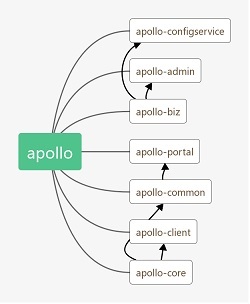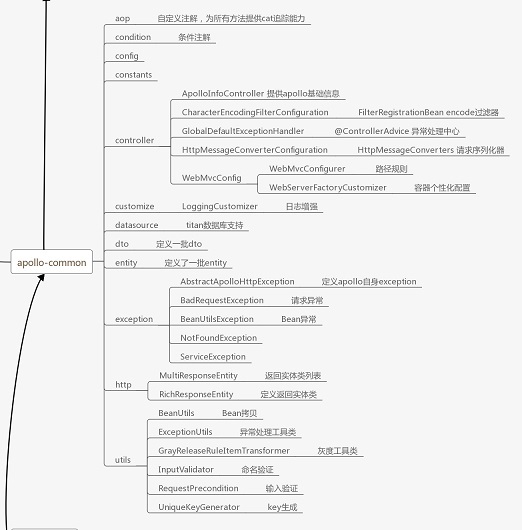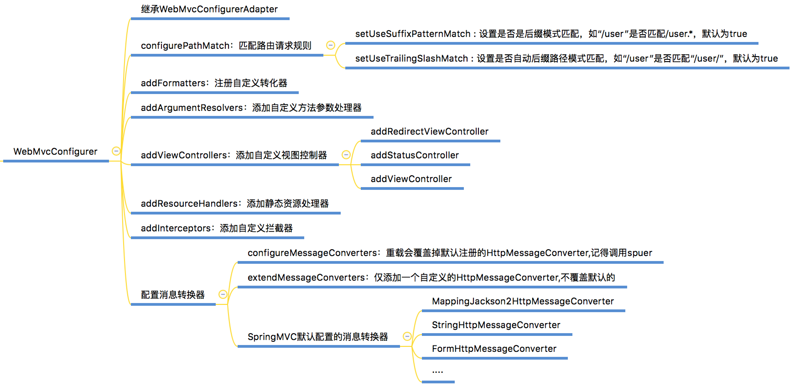Apollo源码分析(二): Apollo的代码层次: apollo-common
不同与其它中间件框架,Apollo中有大量的业务代码,它向我们展示了大神是如何写业务代码的:maven依赖的层次结构,如何进行基础包配置,以及工具类编写,可以称之为springboot之最佳实践。
一 apollo项目依赖
apollo中有7个子项目
最重要的有四个
apollo-portal:后台管理服务
apollo-admin:后台配置管理服务,用户发布了的配置项会经过portal->admin更新到数据库
apollo-configservice: 配置管理服务,客户端通过该服务拉取配置项
apollo-client:客户端,集成该客户端拉取配置项
此外还有apollo-biz,apollo-common,apollo-core提供基础服务
其依赖关系如下

二 apollo-common分析

1 utils 基础包
utils中集成了了一些通用方法,比如判断非空,对象拷贝,字符串拼接等
BeanUtils 拷贝对象
实现不同类对象中属性的拷贝,用法:
//在网络中传输的为DTO对象,而程序中处理的是实体类对象
@RequestMapping(path = "/apps", method = RequestMethod.POST)
public AppDTO create(@RequestBody AppDTO dto) {
...
//DTO拷贝成实体类
App entity = BeanUtils.transfrom(App.class, dto);
...
//实体类再拷贝成DTO
dto = BeanUtils.transfrom(AppDTO.class, entity);
源码:
// 封装{@link org.springframework.beans.BeanUtils#copyProperties},惯用与直接将转换结果返回
public static <T> T transfrom(Class<T> clazz, Object src) {
if (src == null) {
return null;
}
T instance = null;
try {
instance = clazz.newInstance();
} catch (Exception e) {
throw new BeanUtilsException(e);
}
org.springframework.beans.BeanUtils.copyProperties(src, instance, getNullPropertyNames(src));
return instance;
}
ExceptionUtils 将exception转为String
//将exception转为String
} catch (IllegalAccessException ex) {
if (logger.isErrorEnabled()) {
logger.error(ExceptionUtils.exceptionToString(ex));
ExceptionUtils源码
public static String toString(HttpStatusCodeException e) {
Map<String, Object> errorAttributes = gson.fromJson(e.getResponseBodyAsString(), mapType);
if (errorAttributes != null) {
return MoreObjects.toStringHelper(HttpStatusCodeException.class).omitNullValues()
.add("status", errorAttributes.get("status"))
.add("message", errorAttributes.get("message"))
当中用到了Guava的MoreObjects的链式调用来优雅的拼接字符串, 参考Guava Object的使用
InputValidator
验证ClusterName和AppName是否正确
RequestPrecondition
做非空、正数判断等,抽象出了一个类,而不用硬编码了
RequestPrecondition.checkArguments(!StringUtils.isContainEmpty(model.getReleasedBy(), model
.getReleaseTitle()),
"Params(releaseTitle and releasedBy) can not be empty");
UniqueKeyGenerator
key值生成器
2 exception 异常包
封装常用的异常处理类,对常见的异常做了分类,比如业务异常,服务异常,not found异常等,大家做异常时不妨参考下其对异常的分类。
AbstractApolloHttpException
apollo异常基类,设置了httpstatus,便于返回准确的http的报错信息,其继承了RuntimeException,并加入了一个httpStatus
public abstract class AbstractApolloHttpException extends RuntimeException{
protected HttpStatus httpStatus;
...
}
BadRequestException
业务异常类,下图可以看出其对业务异常的分类描述

NotFoundException
某个值找不到了

ServiceException
当对应的服务不可达,比如这段
ServiceException e = new ServiceException(String.format("No available admin server."
+ " Maybe because of meta server down or all admin server down. "
+ "Meta server address: %s",
MetaDomainConsts.getDomain(env)));
BeanUtilsException
BeanUtils中进行对象转换时发生异常类
3 Controller包
封装了异常处理中心,报文转换,http序列换等工具
3.1 WebMvcConfig
实现了WebMvcConfigurer和WebServerFactoryCustomizer
public class WebMvcConfig implements WebMvcConfigurer, WebServerFactoryCustomizer<TomcatServletWebServerFactory> {
而我们的WebMvcConfigurer是个接口,类实现这个接口来具备一定的能力,以下就列出了这些能力

挑重点介绍下
HandlerMethodArgumentResolver
@Override
public void addArgumentResolvers(List<HandlerMethodArgumentResolver> argumentResolvers) {
PageableHandlerMethodArgumentResolver pageResolver =
new PageableHandlerMethodArgumentResolver();
pageResolver.setFallbackPageable(PageRequest.of(0, 10));
argumentResolvers.add(pageResolver);
}
重载HandlerMethodArgumentResolver是做啥用的呢?简单来说就是用来处理spring mvc中各类参数,比如@RequestParam、@RequestHeader、@RequestBody、@PathVariable、@ModelAttribute
而是使用了addArgumentResolvers后就加入了新的参数处理能力。HandlerMethodArgumentResolver中有两个最重要的参数
supportsParameter:用于判定是否需要处理该参数分解,返回true为需要,并会去调用下面的方法resolveArgument。 resolveArgument:真正用于处理参数分解的方法,返回的Object就是controller方法上的形参对象。
比如apollo就加入的是对分页的处理: PageableHandlerMethodArgumentResolver
这里我们可以看个例子,有这样一个业务场景,用户传的报文在网络中做了加密处理,需要对用户报文做解密,相当一个公共处理逻辑,写到业务代码中不方便维护,此时就可以增加一个HandlerMethodArgumentResolver用于解密。代码参考github:xxx
configureContentNegotiation
@Override
public void configureContentNegotiation(ContentNegotiationConfigurer configurer) {
configurer.favorPathExtension(false);
configurer.ignoreAcceptHeader(true).defaultContentType(MediaType.APPLICATION_JSON);
}
视图解析器,这里的配置指的是不检查accept头,而且默认请求为json格式。
addResourceHandlers
静态资源控制器
@Override
public void addResourceHandlers(ResourceHandlerRegistry registry) {
// 10 days
addCacheControl(registry, "img", 864000);
addCacheControl(registry, "vendor", 864000);
// 1 day
addCacheControl(registry, "scripts", 86400);
addCacheControl(registry, "styles", 86400);
addCacheControl(registry, "views", 86400);
}
静态资源的访问时间。
WebServerFactoryCustomizer
定制tomcat,spring boot集成了tomcat,在2.0以上版本中,通过实现WebServerFactoryCustomizer类来自定义tomcat,比如在这里设置字符集
@Override
public void customize(TomcatServletWebServerFactory factory) {
MimeMappings mappings = new MimeMappings(MimeMappings.DEFAULT);
mappings.add("html", "text/html;charset=utf-8");
factory.setMimeMappings(mappings );
}
3.2 GlobalDefaultExceptionHandler
统一异常处理类,用于抓取controller层的所有异常,从此再也不用写超级多的try...catch了。只要加了@ControllerAdvice就能抓取所有异常了。
@ControllerAdvice
public class GlobalDefaultExceptionHandler {
而后使用@ExcepionHandler来抓取异常,比如这样
//处理系统内置的Exception
@ExceptionHandler(Throwable.class)
public ResponseEntity<Map<String, Object>> exception(HttpServletRequest request, Throwable ex) {
return handleError(request, INTERNAL_SERVER_ERROR, ex);
}
在apollo中定义了这几个异常:
内置异常: Throwable,HttpRequestMethodNotSupportedException,HttpStatusCodeException,AccessDeniedException
以及apollo自定义的异常AbstractApolloHttpException
将异常进行分类能方便直观的展示所遇到的异常
3.3 HttpMessageConverters
根据用户请求头来格式化不同对象。请求传给服务器的都是一个字符串流,而服务器根据用户请求头判断不同媒体类型,然后在已注册的转换器中查找对应的转换器,比如在content-type中发现json后,就能转换成json对象了
@Configuration
public class HttpMessageConverterConfiguration {
@Bean
public HttpMessageConverters messageConverters() {
GsonHttpMessageConverter gsonHttpMessageConverter = new GsonHttpMessageConverter();
gsonHttpMessageConverter.setGson(
new GsonBuilder().setDateFormat("yyyy-MM-dd'T'HH:mm:ss.SSSZ").create());
final List<HttpMessageConverter<?>> converters = Lists.newArrayList(
new ByteArrayHttpMessageConverter(), new StringHttpMessageConverter(),
new AllEncompassingFormHttpMessageConverter(), gsonHttpMessageConverter);
return new HttpMessageConverters() {
@Override
public List<HttpMessageConverter<?>> getConverters() {
return converters;
}
};
}
}
apollo中自定了GsonHttpMessageConverter,重写了默认的json转换器,这种转换当然更快乐,Gson是google的一个json转换器,当然,传说ali 的fastjson会更快,但是貌似fastjson问题会很多。json处理中对于日期格式的处理也是一个大问题,所以这里也定义了日期格式转换器。
3.4 CharacterEncodingFilterConfiguration 过滤器
@Configuration
public class CharacterEncodingFilterConfiguration {
@Bean
public FilterRegistrationBean encodingFilter() {
FilterRegistrationBean bean = new FilterRegistrationBean();
bean.setFilter(new CharacterEncodingFilter());
bean.addInitParameter("encoding", "UTF-8");
bean.setName("encodingFilter");
bean.addUrlPatterns("/*");
bean.setDispatcherTypes(DispatcherType.REQUEST, DispatcherType.FORWARD);
return bean;
}
}
加入了一个CharacterEncodingFilter将所有的字符集全部转换成UTF-8.
四 aop包
里面只定义了一个类,用于给所有的数据库操作都加上cat链路跟踪,简单看下它的用法
@Aspect //定义一个切面
@Component
public class RepositoryAspect {
/**
** 所有Repository下的类都必须都添加切面
*/
@Pointcut("execution(public * org.springframework.data.repository.Repository+.*(..))")
public void anyRepositoryMethod() {
}
/**
** 切面的具体方法
*/
@Around("anyRepositoryMethod()")
public Object invokeWithCatTransaction(ProceedingJoinPoint joinPoint) throws Throwable {
...
}
五 condition 条件注解
cloud条件注解
@ConditionalOnBean:当SpringIoc容器内存在指定Bean的条件 @ConditionalOnClass:当SpringIoc容器内存在指定Class的条件 @ConditionalOnExpression:基于SpEL表达式作为判断条件 @ConditionalOnJava:基于JVM版本作为判断条件 @ConditionalOnJndi:在JNDI存在时查找指定的位置 @ConditionalOnMissingBean:当SpringIoc容器内不存在指定Bean的条件 @ConditionalOnMissingClass:当SpringIoc容器内不存在指定Class的条件 @ConditionalOnNotWebApplication:当前项目不是Web项目的条件 @ConditionalOnProperty:指定的属性是否有指定的值 @ConditionalOnResource:类路径是否有指定的值 @ConditionalOnSingleCandidate:当指定Bean在SpringIoc容器内只有一个,或者虽然有多个但是指定首选的Bean @ConditionalOnWebApplication:当前项目是Web项目的条件
ConditionalOnBean
@Configuration
public class Configuration1 {
@Bean
@ConditionalOnBean(Bean2.class)
public Bean1 bean1() {
return new Bean1();
}
}
@Configuration
public class Configuration2 {
@Bean
public Bean2 bean2(){
return new Bean2();
}
在spring ioc的过程中,优先解析@Component,@Service,@Controller注解的类。其次解析配置类,也就是@Configuration标注的类。最后开始解析配置类中定义的bean。
在apollo中使用自定义condition:
用注解实现spi
@Configuration
@Profile("ctrip")
public static class CtripEmailConfiguration {
@Bean
public EmailService ctripEmailService() {
return new CtripEmailService();
}
@Bean
public CtripEmailRequestBuilder emailRequestBuilder() {
return new CtripEmailRequestBuilder();
}
}
spi的定义: SPI 全称为 Service Provider Interface,是一种服务发现机制。SPI 的本质是将接口实现类的全限定名配置在文件中,并由服务加载器读取配置文件,加载实现类。这样可以在运行时,动态为接口替换实现类。正因此特性,我们可以很容易的通过 SPI 机制为我们的程序提供拓展功能。
而 @Profile("ctrip") 是特指在系统环境变量中存在ctrip时才会生效,限定了方法的生效环境。
还有一种常见的方式是做数据库配置,比如在不同的dev,stg,prd环境中配置不同的地址,或者使用不同的数据库:
@Profile("dev")
@Profile("stg")
@Profile("prd")
但这样存在一个问题是无法满足devops的一次编译,多处运行的原则,因此最好是将配置放置与外部,通过不同环境特征来获取不同的配置文件。
看下自定义的condition是如何实现的:
定义注解
@Target({ ElementType.TYPE, ElementType.METHOD })
@Retention(RetentionPolicy.RUNTIME)
@Documented
@Conditional(OnProfileCondition.class) //具体的实现类
public @interface ConditionalOnMissingProfile { //注解的名称
/**
* The profiles that should be inactive
* @return
*/
String[] value() default {};
}
而后再实现类中实现了对环境变量的判断
//实现condition接口
public class OnProfileCondition implements Condition {
//如果match则返回true
@Override
public boolean matches(ConditionContext context, AnnotatedTypeMetadata metadata) {
//获取环境变量中所有的active值, spring.profile.active=xxx
Set<String> activeProfiles = Sets.newHashSet(context.getEnvironment().getActiveProfiles());
//获取profile中的所有制
Set<String> requiredActiveProfiles = retrieveAnnotatedProfiles(metadata, ConditionalOnProfile.class.getName());
Set<String> requiredInactiveProfiles = retrieveAnnotatedProfiles(metadata, ConditionalOnMissingProfile.class
.getName());
return Sets.difference(requiredActiveProfiles, activeProfiles).isEmpty()
&& Sets.intersection(requiredInactiveProfiles, activeProfiles).isEmpty();
}
private Set<String> retrieveAnnotatedProfiles(AnnotatedTypeMetadata metadata, String annotationType) {
if (!metadata.isAnnotated(annotationType)) {
return Collections.emptySet();
}
MultiValueMap<String, Object> attributes = metadata.getAllAnnotationAttributes(annotationType);
if (attributes == null) {
return Collections.emptySet();
}
Set<String> profiles = Sets.newHashSet();
List<?> values = attributes.get("value");
if (values != null) {
for (Object value : values) {
if (value instanceof String[]) {
Collections.addAll(profiles, (String[]) value);
}
else {
profiles.add((String) value);
}
}
}
return profiles;
}
}
- 本文标签: spring ioc tar Property 管理 AOP 服务器 解析 copyProperties 加密 ip entity 配置 ioc 时间 springboot db Collections provider message NSA Collection web HTML BeanUtils springioc tomcat src map bean 代码 validator 源码 json final js ACE IDE IO java App list JVM servlet client cat Service GitHub Spring Boot 定制 DOM 参数 https http 数据 cache spring CTO value ArrayList mail build 数据库 Action Google id 编译 Document 分页 HashSet git core UI ORM CEO 本质 maven key
- 版权声明: 本文为互联网转载文章,出处已在文章中说明(部分除外)。如果侵权,请联系本站长删除,谢谢。
- 本文海报: 生成海报一 生成海报二











![[HBLOG]公众号](https://www.liuhaihua.cn/img/qrcode_gzh.jpg)

